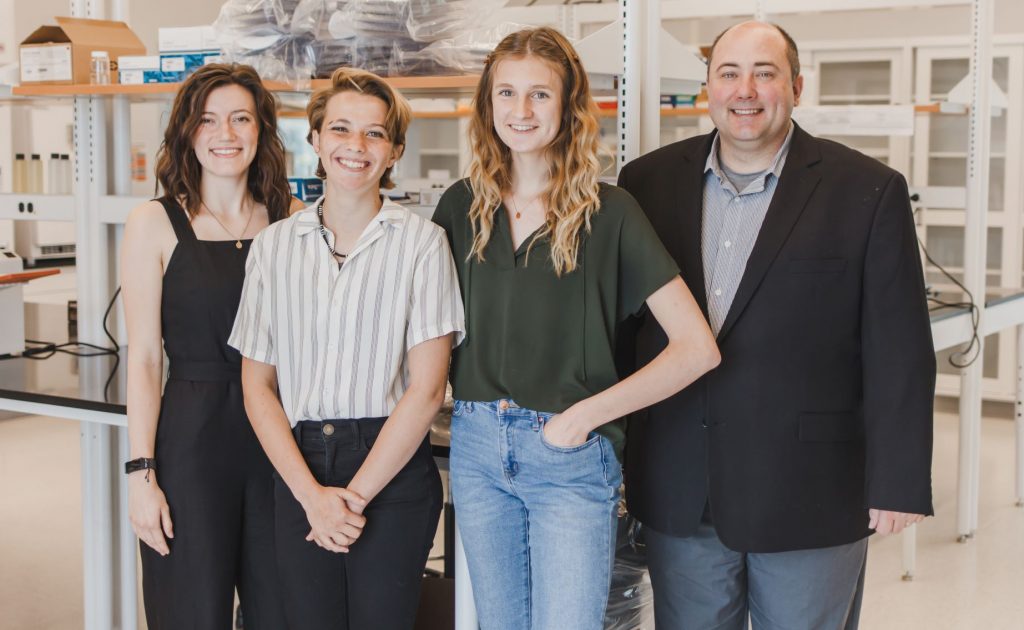
The Lilly Center for Lakes and Streams at Grace College Launches Summer Algae Research Team

This summer, the Lilly Center for Lakes and Streams’ research team has expanded to include a formal algae team led by Grace College faculty and students. After the Lilly Center’s research team brings back water samples from local lakes, the algae team makes microscope slides to identify, count and document what they find. That information is used in the Lilly Center’s research which informs their efforts to keep local lakes clean, healthy, safe and beautiful.
“The algae research has significantly increased our capabilities,” said Dr. Nate Bosch, director of the Lilly Center for Lakes and Streams. “The algae team’s findings help provide a picture of the health of our lakes and allow us to see trends and patterns we might not see otherwise,” he said.
Ry Rynaldi, a senior biology major with minors in environmental science and chemistry from Cedarville, Ohio, was hired as the first algae lab staff member. She handles the managerial duties of the lab such as calibrating equipment, making algae slides, collaborating with other algae-based organizations and writing up protocols for the lab.
“Studying algae may not sound very important, but there are actually very toxic forms of algae that exist in freshwater lakes like ours,” said Rynaldi. “These kinds of algae are called cyanobacteria. They can kill pets and wildlife, cause dermatitis in humans and even irritate the airways of those who breathe in the vapors or drink the water. It is our goal to study these forms of algae so that we can predict and prevent their dangerous blooms,” she said.
Rynaldi, who has worked at the Lilly Center since 2018, is also earning senior internship credit through her focus on picocyanobacteria which are forms of cyanobacteria that are too small to identify. It is her aim to figure out how to culture the picocyanos so that the Lilly Center can better learn how to identify them during our counting.
Rynaldi is working alongside Dr. Joseph Frentzel, chair of the Department of Science and Mathematics and algae team leader. According to Bosch, Frentzel has worked hard to establish the algae team as the go-to algae experts in northern Indiana.
“A partnership between the biology program and Lilly Center seemed like a natural fit given the acute interest in toxin-producing cyanobacteria populations in Kosciusko county lakes. Through this collaboration, students have developed high-level microscopy skills which will easily distinguish them among graduate school applicants following graduation,” said Frentzel.
One such student is Morgan Burkholder, a second-year environmental science major from Warsaw, Indiana.
“This is a really great opportunity for me, as I am gaining valuable and unique training that will equip me for whatever comes next. The work I am doing for the Lilly Center will transfer seamlessly to another lab tech position or to graduate school,” said Burkholder. “Now that I know how much I enjoy being in the lab, I might even pursue phycology — the study of algae — as a career. I am so thankful for the opportunity that I have been given through Grace College and the Lilly Center,” she said.
According to Frentzel, the opportunity is not only academically stimulating but also faith-building. “The microscopic algae that we routinely see are stunningly complex and in many instances quite beautiful. It has become commonplace for members of the lab to remark that these communities of ornate photosynthetic organisms are most certainly evidence of God’s handiwork,” he said.
Rynaldi agrees.
“I love this job the most because every time I look into the microscope, I am able to visualize this whole new, incredibly vast and beautiful world that, in a way, makes me feel small in comparison. To me, this is a reminder of my Creator, because only God could use microscopic organisms to make you feel small,” said Rynaldi.
To learn more about Grace’s biology or environmental science program, visit www.grace.edu/academics/
Previous Post

